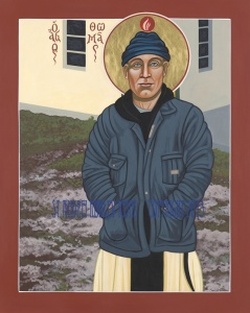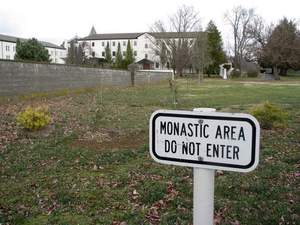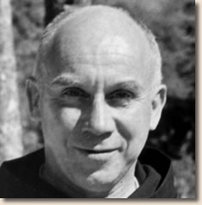 Ever since I can remember, Thomas Merton has been part of my spiritual life. When I first began to actively develop my faith life many years ago my spiritual mentor suggested that I read the New Seeds of Contemplation, one of Merton’s most famous books on prayer. It resonated deeply with me even though I did not yet have the capacity to pray that way. But it was ground-breaking for me and is one of my favorite books on prayer to this day. (I bought my first copy in the 1970’s for 95 cents. It became so dog-eared and worn that I recently had to get a replacement copy.) This book gave me great hope and deep desire to grow into the kind of prayer life of which he wrote so beautifully. His writing has been a constant in my life, so one could say I have been hooked on Merton for quite a while. This weekend, Thomas Merton would have been 100 years old. Therefore I felt it was fitting to reflect upon the impact he had on me (and so many others) through his writing. Merton was born on January 31, 1915 and he died somewhat young, on December 10, 1968. In between he lived a rather full life as a Trappist monk, known as Fr. Louis within the monastery.* He never hid his brokenness, nor thought of himself as holy. He exposed his ‘feet of clay,’ an often sarcastic wit, an ability to shake up the social norms with his growing sense of social justice, a yearning for the feminine (his mother died when he was very young, something he never really got over), and a quest for justice in various social issues. All of these characteristics were fed by his insatiable hunger for God. With a continual desire for solitude and contemplation he became very self-aware. He was a man of deep prayer and love which was obvious in his obedience to God’s call. And that is why I think he was indeed holy.  Merton was a monk, yet his openness to God led him to have a ‘conversion’ experience which took place outside the monastery, at the intersection of 4th and Walnut in Louisville, Kentucky. Having left the monastery for a medical appointment, he had a mystical experience while standing at the corner. He saw many people coming and going, all of whom were strangers, and yet he was filled with profound love for them. At that moment he realized that he was intimately connected with the world, and not separate from it. He came to see in that one instant, that he was compelled to be involved with the world through his prayer and reflection and that he could and should be active, even from within the enclosure. He went on to be the pre-eminent voice of the 1950’s and 60’s, writing about issues of peace and justice. He wrote prolifically about social issues in books, magazines, and numerous articles, all these in addition to the many books he wrote on prayer and spirituality. He was often criticized during these years, but he did not waver from a love for the world that was so great, that he could not remain silent. Merton was eventually given permission to live in a hermitage on the grounds of the monastery. However, given his spiritual connection to the world it is almost fitting that he died outside the monastery while in Thailand on a trip which culminated in a religious conference where he was to speak. He was a brilliant man, but he never ceased to be starkly aware of his own struggles and weaknesses. What made him so special is that he managed to always keep his eyes and ears on God such that he could follow a call to “stick his neck out” for the work of the gospel. I do not think he could have contained his thoughts and beliefs if he wanted to do so. We can learn so very much from Thomas Merton. However, I want to focus on the passion with which he lived. He had passion which was so great that he suffered from a type of loneliness that was not about the lack of people so much as it was a true longing for God. He wanted to know God fully so he could love Him fully, and he sought to express this love through his writing, especially in his desire for justice and peace. This passion is a grace which we, too, should pray to have in our own spiritual life. For what do we yearn passionately? Do we pray asking God to help us work at that which is our passion? While we may never have a ‘4th and Walnut’ experience like Merton, we need to tap into that for which we have most passion because it is there that God dwells deep within our hearts.  God knows us better than anyone else, and therefore He inspires us to use the gifts we have been given. Knowing our gifts, He knows therefore, what would make us happiest. As Merton wrote so well, God calls us to be our true self rather than to live out of a false sense of self. The false self is who we think we are based on an accumulation of masks we put on, things we have been told about ourselves, or false perceptions which we begin to believe. The true self is the person we were created to be by God, which is revealed when we let the false self be stripped away. The quest for holiness is really a desire to grow into the true self. The gospel Jesus preached teaches us to be our true self, that is, to love. To love like this means to put our own selfish desires aside, to think of the others who our lives touch, to think of the ramifications and repercussions of our actions. In short, the true self is other-centered; nothing is really about us, but about the greater good of the other and of the world. While not everyone is a writer as gifted as Merton, and while not everyone is called to be a social activist in the public eye, each of us is called to work for justice by writing with the story of our lives. In other words, we are called to live the gospel in the way that is most suited to the situations of our lives and our unique set of traits. Merton was gifted in prayer and in eloquence. He had a thick skin about the criticism he garnered. But even when he faltered, he knew he needed to stay true to his call, living the gospel as he was created to live it, thus glorifying God. We, too, are called to glorify God with our lives.  Merton wrote: “[But] the question of love is one that cannot be evaded. Whether or not you claim to be interested in it, from the moment you are alive you are bound to be concerned with love, because love is not just something that happens to you: it is a certain special way of being alive.” ** As Lent is approaching each of us might want to think and reflect over what we might do to live this special way of being alive. We do not have to leave the lives we already live, just as Merton did what he did from behind monastery walls. But we can begin by looking at what our areas of selfishness might be, the weaknesses and fears that keep us from following the call to love, and how well we are utilizing the gifts we have been given. We can pray to be more courageous in living the gospel life, speaking up when we can or should, not just with words, but with actions. We can reflect on what we have done to live the gospel, and pray to keep on doing those things. And we can let Thomas Merton be our friend and guide to living as our true self, passionate about God and living in a way that is healing to those whom we meet. We can all work for peace by being people who live the love of Christ. A peaceful presence does far more than we know or imagine. There is plenty of turmoil and unrest in the world, many of our friends and family are suffering from one thing or the next, and we, too may be suffering. But what brings healing and hope is to cling to the message of the gospel, our faith in God, and knowing that simple acts of love can and will change our world. May we ask for the intercession of Thomas Merton so that we might find and live our passion! May we learn to be our true self through prayer, realizing that while we are not perfect, we are very loved by God! May we grow in love for God so that everything we do is oriented to the gospel! May we be peacemakers in thought, word, and deed! And may we follow the way of Christ, becoming instruments of healing through our loving actions! Let us continue to meet in the heart of Jesus! Peace! ©Michele L. Catanese * A good, short biography of Merton is found at http://www.law.louisville.edu/cardinallawyer/node/61. If you want more details about his early life, you can read his autobiography, The Seven Storey Mountain, which only covers the time up until he entered the monastery. There are many good books on Merton that one can find to learn more about him. You can find some suggestions of Merton's writings on my book list found at http://www.catanesesd.com/books-about-prayer.html and http://www.catanesesd.com/micheles-book-corner.html **The quote is from page 27 of Love and Living, a compilation of essays by Thomas Merton, edited by Naomi Burton Stone and Br. Patrick Hart (a fellow monk). The icon is Holy World Evangelist Thomas Merton, by Fr. William Hart McNichols. It can be found at http://fineartamerica.com/featured/1-holy-world-evangelist-thomas-merton-william-hart-mcnichols.html The photo of Gethsemani Monastery was part of an article actually unrelated to Thomas Merton. Here is the credit:The Abbey of Gethsemani in Nelson County, Ky. (Peter Smith, The Courier-Journal) The next photo was one I took in Bath, England. The photo of Thomas Merton is from the monastery archives and can be found at http://www.monks.org/index.php/monks-pages/thomas-merton. This site includes another biography of Merton as well. Comments are closed.
|
Heart Speaks to Heart
|

 RSS Feed
RSS Feed

